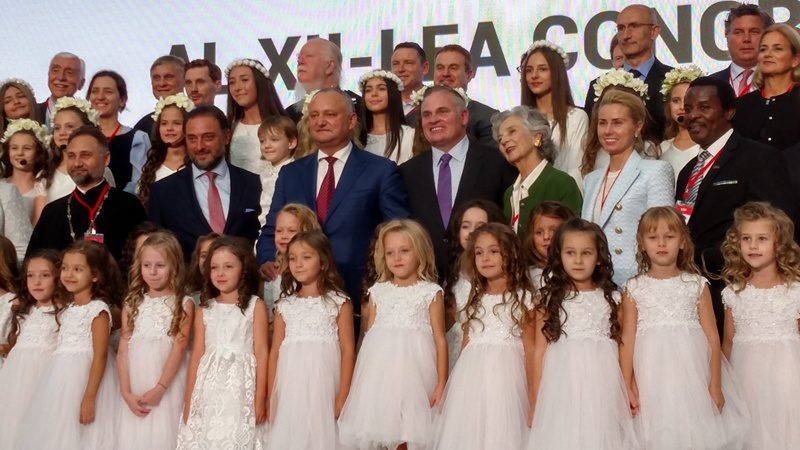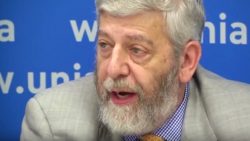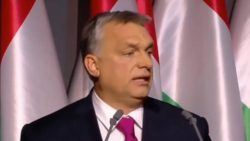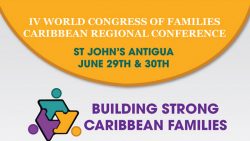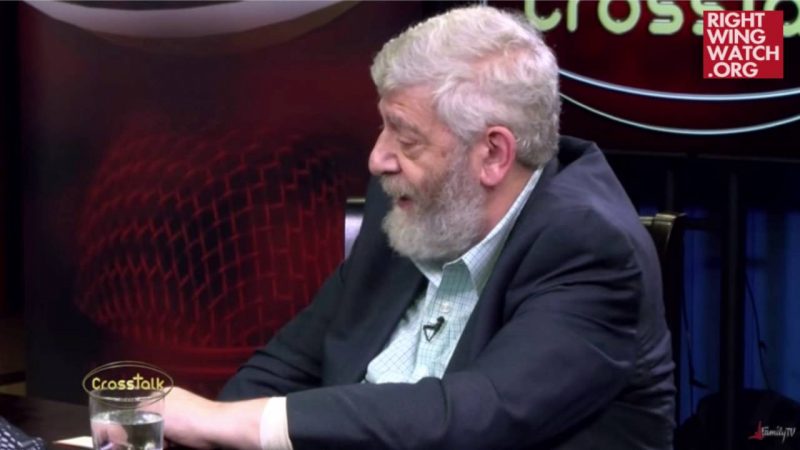While U.S. Religious Right leaders are preparing to gather in Washington this week for the Values Voter Summit to strategize about holding onto the political power they wield in the era of Trump, anti-equality activist Brian Brown and some of his allies spent this past weekend in Chisinau, the capital of Moldova, where culture warriors from around the world gathered to make plans for resisting and reversing LGBTQ equality and access to safe and legal abortion on a global scale.
Among the other U.S. Religious Right activists taking part were Brown’s colleague Allan Carlson, the Family Research Council’s Peter Sprigg, Sharon Slater of Family Watch International, and Utah-based evangelical activist Greg Johnson. Also on the schedule were several American academics, including Catholic University of America’s Pat Fagan, Brigham Young’s Tim Rarick, and Patrick Henry College’s Stephen Baskerville.
In addition to leading the anti-LGBTQ National Organization for Marriage, Brown heads the International Organization for the Family, which counts the World Congress of Families as one of its projects. WCF generally hosts an annual global summit and several regional gatherings every year, where organizations share experiences and strategies. The summit in Moldova marked the third year in a row that the conference was held in an Eastern European country–following Georgia and Hungary–and it featured an “East meets West” theme.
When the World Congress of Families met in the United States in 2015, its leaders tried to downplay the group’s anti-LGBTQ record and agenda, but nobody bothered to do that in Moldova, where speakers regularly referred to “perverts” and “perversion” and called for changes to national laws and constitutions to define family according to the WCF’s standards: a married man and woman and their children, and the more the better.
At the WCF, the European Union, the LGBTQ rights movement, and civil society organizations supported by philanthropist George Soros were vilified as threats to the family and as “aggressive” promoters of “political correctness” and “gender ideology”–an umbrella term used by social conservative activists that can include LGBTQ equality, abortion rights, and sex education.
In his remarks to the gathering’s opening plenary, Moldova’s anti-gay President Igor Dodon slammed promoters of “anti-family ideology” and said that propagandizing on behalf of sexual minorities should not be allowed in the country and that gay pride celebrations should be illegal.
GENDERDOC-M, a group that advocates for LGBT rights in Moldova, responded to Dodon’s comments, saying that having the president instigate discrimination against the LGBT community was “a serious violation of the law and a severe act of discrimination.”
But Brown gushed with gratitude and praise for Dodon, saying that Moldova is “blessed” to have a president who “is willing to stand for the truth.” It was Dodon who made the pitch to bring the WCF to Moldova and provided the political will to make it happen; meanwhile, money for the event came from the inscrutably funded charitable foundation run by Dodon’s wife. At the closing ceremony, Brown returned to his praise for Dodon, saying that while plenty of politicians say the right things, activists should “cherish” the ones who make things happen.
In Moldova’s parliamentary system, Dodon does not wield the same kind of political power as Hungary’s strongman Prime Minister Viktor Orban, whose government hosted the WCF last year. Like Orban, however, Dodon and his political party are aligned with Russia and Putin and against the progressive social policies of the European Union.
Speakers at WCF in Chisinau called the equal-rights advocacy of the European Union an effort to impose a foreign ideology, like the Soviet Union’s imposition of communism in the region–a stunning comparison given that Stalin forcibly deported tens of thousands of Moldovans to Soviet gulags and imposed a famine that killed 200,000 Moldovans, according to an exhibit at the Museum of National History.
During the Obama administration in the U.S., when support for LGBTQ human rights was an American foreign policy priority, U.S. Religious Right leaders began aligning themselves with Russian President Vladimir Putin, praising his anti-gay policies and embracing his government’s positioning as a defender of Christian civilization against the decadent and secular West.
No one is more enthusiastically allied with Putin and his Russian religious and political allies than Brown and the WCF, which grew out of conversations between Russian and American social conservatives in the mid-1990s, and which has drawn financial and political support from Putin-supporting oligarch Konstantin Malofeev–who is known as “God’s Oligarch” for his devotion to Orthodox Christianity and who wants to make Putin a Tsar–and his St. Basil the Great Foundation. In Moldova, Elena Milskaya, Director General of the St. Basil (Vasily in Russian) foundation, spoke more than once at the gathering, and said the foundation had brought many of its friends to Moldova.
Putin’s demonstrated disregard for democratic values, including his restrictions on religious freedom for members of minority religions, has not noticeably dampened Brown’s enthusiasm; the same is true for Orban, who Brown praises in spite of Orban’s systematic dismantling of checks and balances and repression of dissent.
Dodon is apparently hoping that the WCF might help his Putin-friendly Socialist Party make gains in legislative elections that were scheduled for this fall but have recently been postponed until February. Part of his strategy, following Putin’s playbook, is to align himself closely with the Orthodox Church and assert its primacy as a defender of national identity and values. At an opulent solemn Sunday morning service in the cathedral that sits at the center of a park in downtown Chisinau, camera crews captured Dodon’s displays of piety from every angle.
While it was a blow to the prestige of the conference when Patriarch Kirill of the Russian Orthodox Church was a no-show due to tensions within and among the world’s national Orthodox churches, Kirill’s personal representative was among several prominent clergy and Orthodox lay leaders who spoke at the gathering.
Alexey Komov, WCF’s representative in Moscow and a close associate of Malofeev, had a highly visible role at the conference, where he talked about his current efforts to promote homeschooling in Russia; he also announced that he was holding a meeting after the conference to promote his curriculum to interested activists in Moldova.
Brown acknowledged that he has been criticized for his closeness to Putin, but argued that the WCF’s efforts to create friendships and relationships across lines of nationality and religion were not only promoting family values but creating peace. Komov talked about his efforts to create a “friends of Mt. Athos” group that would allow Catholic and Protestant leaders to visit the historic Orthodox stronghold. Brown said he has now visited Mt. Athos three times, once with Dodon.
The Catholic Church, Brown’s spiritual home, was represented by the Vatican’s Secretary of State, Cardinal Parolin, who addressed the closing session, warning that “God’s plan for marriage and the family” was threatened by individualism, materialism, and consumerism. A Mormon leader from South Africa who is now based in Moscow also spoke.
In the coming days we’ll be reporting in more detail on speakers and themes from the conference, which included speeches and sessions on:
- Learning from political victories for “pro-family” policies–meaning anti-LGBTQ, anti-choice, anti-sex-ed–from around the globe, including Africa and Latin America;
- Defeating the threat posed by “gender ideology” and the West’s push for marriage equality and recognition of transgender identity;
- Promoting traditional gender roles; and
- Advocating for home-schooling as a fundamental human right and as a strategy for traditionalist parents to prevent secularist schools from undermining their efforts to pass their values on to their children.
In advance of the WCF, human rights organization Promo-LEX released a statement noting the WCF’s pattern of “aggressive discourse against social groups that do not fit into the ‘patterns’ of the ‘traditional family.’” The group criticized discourse that “incites hatred and discrimination” and said that is not what Molodvan families need:
Families in Moldova need quality services in health, social support, education, decent living, good salaries, well-paid jobs in the country. Cultivating hatred against those who do not meet “traditional family standards” can not in any way solve these problems. Every family needs not only respect, care, love, effort and mutual understanding, but also concrete actions to solve real problems.
Brown met with Dodon after the event to praise local organizers and to officially invite the Moldovan delegation to next year’s summit, which will be held in Verona, Italy.
Meanwhile, in neighboring Romania on Monday, a court approved an effort by “family values” activists to put a referendum on the ballot calling for a change to the Constitution to restrict marriage to a man and a woman. Religious Right groups, including ADF International and the European affiliate of the American Center for Law and Justice, have been backing the effort; last year, Liberty Counsel sponsored a speaking tour in Romania for Kentucky county clerk Kim Davis, who became a Religious Right folk hero when she defied a judge’s order to give a gay couple a marriage license after the U.S. Supreme Court’s marriage equality ruling.





